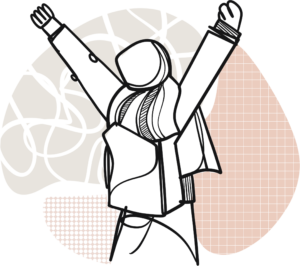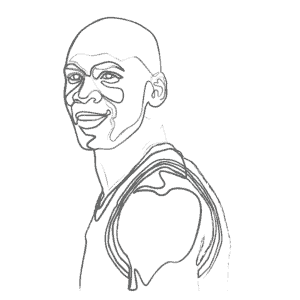
Threes are driven, efficient and enterprising. They are high-energy people who believe in themselves and in developing their talents. Threes want to achieve success as it is defined by their culture, their family or their social circle. In order to meet this goal, they perform in ways that will earn them praise and attention – which is why they are often called “Performers“.
Threes are great at getting things done, but they have trouble accessing their own feelings and develop a sense of who they are – apart from how others see them. In their need to be seen as successful, they can become workaholic, dishonest and even start pretending to be someone they actually aren’t.
Type Three is the type that usually looks the most impressive when observed from the outside. They are charming, attractive and seem to have it all together at all times. They work hard, and in fact can seem to still be “on the job“, even in their off-time. Threes can be very inspiring, and they usually don’t have trouble having lots of admirers.
Threes know how to get things done quickly, efficiently and with the most chance for success. They know how to sell themselves, and basically anything else too. They have an amazing eye for what other people want and then turn into the person that can give them exactly that. Behind their glittering appearance, however, Threes are goaded by a relentless driver that is never satisfied with their achievements, always demanding more. Other people get the sense that not everything can be as glamorous as Threes present it, which let’s them appear superficial, hollow and inauthentic.
Threes want to be seen and appreciated for what they achieve, and they put a lot of effort into presenting an impressive and admirable image to others.
Threes are part of the “heart group“ of the Enneagram, together with Twos and Fours. All three types have a special relationship to shame and their sense of self-worth. While Fours long to be authentic and unique, and Twos try to get love and acceptance from giving themselves up for others, Threes are afraid they aren’t worthy of love if they don’t perform better than everyone else.
During childhood, Threes have picked up the message that their value depended on whether they met the expectations of others. Love could only be earned with doing things that met those standards, so Threes have tried to become the perfect prototype of the golden child. In order to function on that level, they had to put their emotions to the side. Having your own identity and definition of what was necessary to earn love was not okay anymore. So they learned to always try to be the best, and if they couldn’t get there, they learned that pretending they were could get them just as far.
Threes believe that you are what you do. They live in a world where you are only as valuable as your last success, so with every goal they achieve, they are already focused on the next one, meaning they can never truly catch a break. Since they take their definition of success from the culture around them, they end up chasing after status symbols and accomplishments that aren’t even necessarily their own.
That’s why the main struggle of Type Threes is honesty and authenticity. They have spent so much of their life being who other people needed them to be that they don’t even know who they are when nobody is looking.
Threes become healthy once they stop chasing after the admiration and praise of others. In doing so, they can finally catch a break, enjoy their achievements without needing to instantly run towards the next one, get honest with their own emotions, who they want to be and what they want from life.
The message Threes are allowed to reclaim is that they are loved and valued for who they are, not for how well they meet anyone’s expectations. Their feelings and identity matter. They are allowed to rediscover what they define as worthy, valuable and successful.








Your personality isn’t a fixed thing. People grow. While we don’t change our basic personality, we all can become more mature and healthy inside our personality. But at times, we also revert to less healthy behavior. This looks different for every personality type. Let’s see how it unfolds for Threes.
On average levels of psychological health, the most important thing for Threes is to be viewed as accomplished and successful by others, and for that, they are willing to become whatever person others need them to be. Threes have the uncanny ability to read a room, intuit what the people in it value the most, and then craft a persona that wins those people’s approval. With people skills like that, they tend to be the popular kids. But because of that focus on their image and status, average Threes tend to have trouble actually being honest to themselves – and sometimes others. It’s hard to know who you are when you spend all your days being what others want you to be.
When psychologically unhealthy, Threes don’t learn to disconnect their sense of self-worth from their achievements. Their need to be praised for what they do turns into desperation. They start paying higher and higher prizes for getting that win, that promotion, that woman or man, they think they need to be happy. Unhealthy Threes often become workaholics, burn out or eventually get caught in their own web of lies. Those can be the saddest stories: Threes who never learned to be honest to themselves.
Healthy Threes have learned to love themselves for who they are, and not for what they do or what others think of them. This enables them to love others freely as well. If you combine this trait with the ambition, energy and goal-oriented work ethic of Threes, you can imagine how healthy Threes become real powerhouses of action and achievements that contribute to something bigger than themselves. Since they no longer need to lie about themselves, they become authentic role-models who inspire others.
With a Type Two wing, the goal-oriented nature of Type Threes gets pushed towards the realm of relationships. These Threes are more in touch with their emotions and focus more on advancing others than themselves.
The introspective and emotional Type Four wing adds a bit of contradiction to the outgoing and performance-oriented Three. It makes them more self-aware and authentic and gives them a finer sense for the aesthetic.
It’s not unusual that people are not sure which Enneagram personality type they really are. If that’s you, don’t worry, it’s totally normal. The Enneagram doesn’t just look at your behavior, but at the motivation behind your behavior. This means that some Types can look similar on the outside.
What happens most often for Type Threes is that they get confused with Types Seven and Eight. Sometimes, they also mistype themselves for Fives, Ones and Nines.
Since every type has two wings, you might also be unsure whether Type Two or Type Four, your wings, might actually be your main type.
You can learn how to safely tell Type Three apart from all the other Enneagram types here.
Finding out about your Enneagram type shouldn’t be the end of your journey of discovering your personality. The Enneagram is an amazing tool to help you on your journey to become more self-aware and self-accepting.
These five ideas are only a first step to get you started. Get your premium profile to find out much more about how you can use the Enneagram to become your healthiest self!
One of the most helpful things for Threes is to learn to be alone – be it in nature or in their room – to slow down and find times of silence for contemplation and self-reflection.
Having at least one close friend or a partner they can be vulnerable with is essential for Threes to open up. They need people to love them not just at their best, but also at their worst. It’s hard to go it all alone.
Being successful is not a bad thing in itself: The call for Threes is to find a definition that isn’t derived from the opinions of others but from their own values and desires.
Not being first isn’t a euphemism for being a loser. Learning to view failures and setbacks as opportunities to grow instead of threats to their identity is crucial for Threes.
Nothing is easier for Threes than to push ’unimportant‘ issues to the back of their mind until it’s too late. But there is no need to wait until the car has hit the wall – the sooner they ask themselves the tough questions, the more they benefit from it.